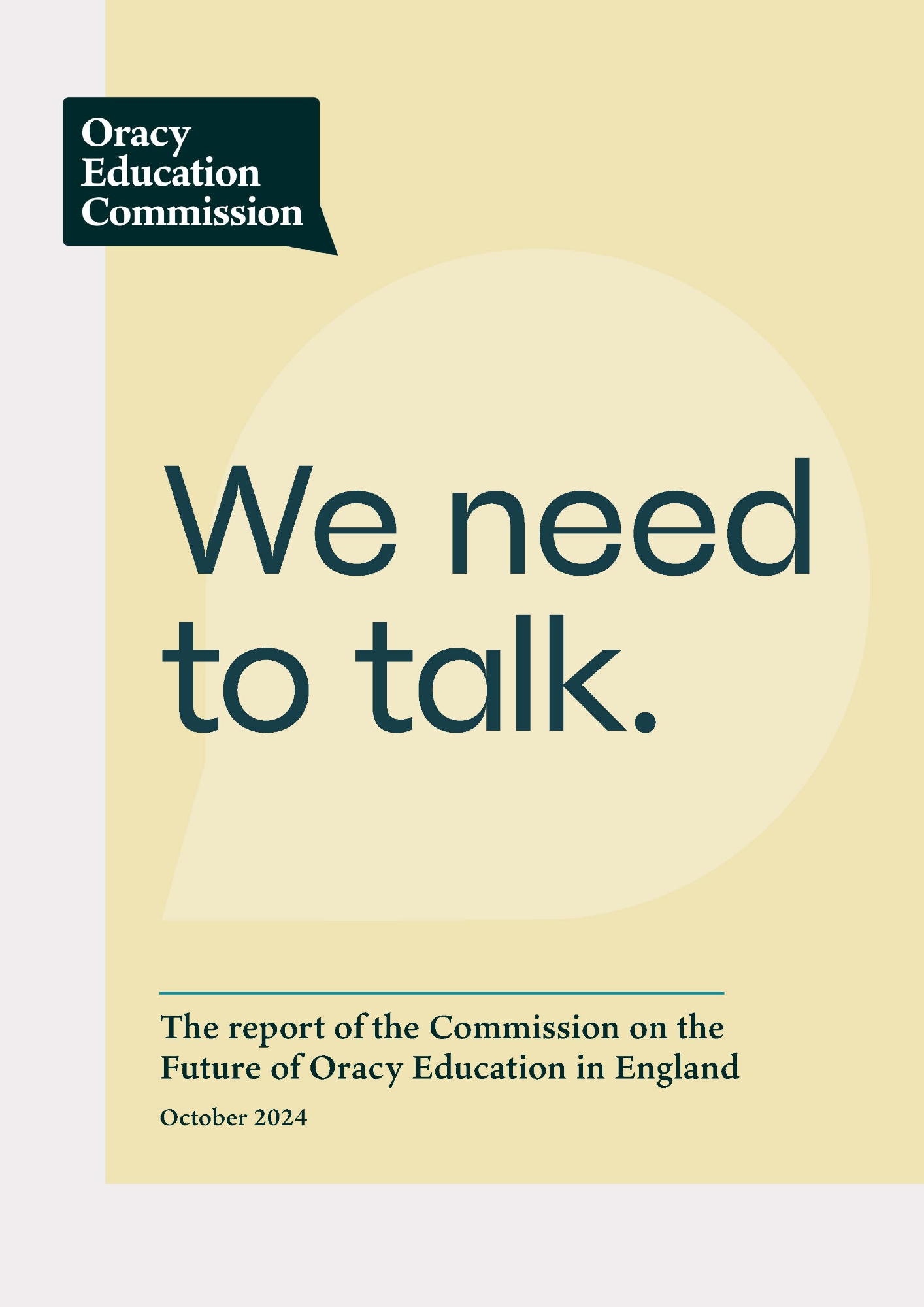Do we need to talk - about oracy?

Published on 8 October 2024, the Commission on the Future of Oracy Education in England’s We Need To Talk report makes the case that oracy should be viewed in education as the fourth “R”, equal in status to reading, writing and arithmetic.
The Commission’s report states that learning to, through and about talk is key to the preparation of children as future citizens and calls for teachers to be given more training on oracy education, based on evidence of ‘what works’. This article will explore the headlines of the Report’s case for oracy, its recommendations for action, and consider possible actions for schools and settings in response.
 We need to talk – why?
We need to talk – why?
The report cites a variety of reasons why we need a higher focus on oracy and communication as core skills for life and work in the future. These include exponential advances in technology capability and usage, the rapidly changing nature of work (it has been claimed that by 2040 only 7% of the jobs we currently recognise will still exist), the challenges of continuing to engage our young people and develop positive attitudes towards education and learning for life, and the inevitable reference to the legacy of the Covid pandemic. We can add to this the fact that lists of the ‘top skills’ employers look for in new employees consistently include communication skills, teamwork, listening skills and empathy.
The report’s contributors also point to the positive impact of an increased emphasis on oracy development in terms of:
Identity and self-expression - in supporting children to be able to articulate ideas, feelings and opinions, we deepen their sense of identity and belonging, contributing to mental health and wellbeing.
Promoting democracy and positive citizenship - by enabling young people to ask questions, articulate ideas, listen effectively and be able to ‘agree disagreeably’.
Equality – those from disadvantaged backgrounds are more likely to fall behind their peers in the development of early language and speaking skills.
We need to talk – how?
It is refreshing to read in the first few pages that the report categorically states that the route to establishing oracy as the fourth fundamental building block of education should NOT be focused on:
- The introduction of a national oracy strategy or ‘ oracy hour
- Calling for it to be explicitly inspected by Ofsted
- Introducing high-stakes exams or tests of oracy
- Compiling lists of ‘gimmicks’ or supposed ‘quick fix’ strategies for the classroom
Instead, the report calls for a ‘joined up’ approach across curriculum, teacher professional development, assessment and accountability, which is then reflected in four key recommendations for change, summarised below.
- MAKE ORACY A CORE ASPECT OF EDUCATION FROM EARLY YEARS TO POST 16
- Adopting a broad and expansive definition of oracy and embedding this throughout the curriculum.
- Introducing an oracy entitlement throughout the primary and secondary National Curriculum.
- Investing in early language development to reduce language inequities.
- Incentivising schools to provide a broad curriculum that enables children to access the value of the expressive arts and citizenship as contexts for oracy.
- Integrating the study of spoken language into the secondary English curriculum, enabling young people to develop critical language awareness.
- BUILD ORACY INTO TEACHER TRAINING AND DEVELOPMENT
- Ensuring that all teachers are skilled in using dialogue and discussion to enhance learning, through initial teacher training and ongoing teacher development.
- Requiring that teacher training and development includes understanding of Speech, Language and Communication Needs (SLCN) and strategies to support children with these.
- Making the role of oracy a key component of leadership development.
- Providing a programme of professional development to support an oracy entitlement through subjects, PSHE and as part of the school day.
- PROMOTE EVIDENCE-BASED APPROACHES TO ORACY
- Publishing non-statutory guidance to support school leaders and teachers in implementing high-quality oracy education.
- Supporting subject associations in providing training and resources to develop disciplinary approaches to oracy.
- Establishing a foundational body and evidence-based source of expertise that outlines the key elements and components of high-quality oracy education.
- REFLECT THE SCOPE AND VALUE OF ORACY IN ASSESSMENT AND ACCOUNTABILITY
- Reforming GCSE English Language to Include teaching about the history of the English language, its influence and influences.
- Increasing the emphasis on assessment to enhance learning, through the provision of diagnostic and formative assessment tools.
- Investigating the feasibility of formal assessment of speaking & listening to recognise a young person’s proficiency in spoken language and communication (at KS 3 or 4).
- Acknowledging the role of oracy in delivering quality of education and personal development as part of a new school ‘accountability dashboard’.
We need to talk – implications for schools?
We know that in 2023 Keir Starmer announced that a Labour Government would “make oracy a priority at all stages of education – so that every young person leaves school with the confidence and skills to use their voice to overcome barriers and make the most of their lives.” We also know that ‘embedding oracy’ is cited as a cornerstone of the current curriculum and assessment review. As educators we need, therefore, to be prepared for the publication of Government policy directives. But is there anything we can be doing in the interim?
We can:
- Engage with the ‘Commission Conversations’ (Spotify link within the report) - recorded dialogues between representatives of the education sector that underpin the report - to develop a shared and informed understanding of what oracy is, and is not.
- Consider the implications for our own context and practice of the report's agreed definition of oracy: “Articulating ideas, developing understanding and engaging with others through speaking, listening and communication”.
- Reflect on the status within our current curriculum and pedagogy of the three interrelated components listed below, using the useful summary on pages 28 and 29 of the report and the best practice case studies and subject-based examples included throughout:
- Learning to talk
- Learning through talk
- Learning about talk
In conclusion
No matter what eventually does – or does not – become enshrined in Government policy, this report provides valuable food for thought and reflection, focusing our attention not just on oracy, but on the ‘big issues’ of the changing nature of our modern society, and the implications for the design of education and learning within this context.
We need to talk. The report of the Commission on the Future of Oracy Education in England (October 2024)
Read our other Spotlight on Evidence articles here.
